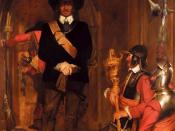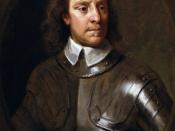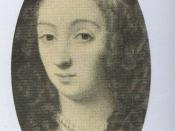O the 17th March 1649, King Charles I was dead and the 'Rump Parliament' abolished the monarchy. The following period would be known as the interregnum as England became a republic ruled by the leader of the army; Oliver Cromwell. Oliver Cromwell was known for criticising Charles' ruthlessness and abuses of his power but it is believed by some that Cromwell was after power himself.
The first action of Cromwell's that led me to believe that he was after power was when he stood outside of Parliament and barred all of the MPs who opposed his beliefs from entering. This seemed to show that he was determined to have a country the way he wanted it to be and this seemed to be similar to the actions of a dictator who disallowed the views of others to be put forward. On the other hand, he could have also believed that the MP's he banned were followers of Charles' beliefs and would bring back a monarchy to the country.
Cromwell was then condemned for his brutal treatment of Catholics in Ireland. He had complained about Charles' ruthlessness but then he admitted that "over 1000 were put to the sword" under his orders. He said that they had rebelled and it was the "righteous judgement of God" to kill them. This reminds me of Charles' belief in the Divine Right of Kings and how he was the chosen one. Oliver proved to be more of a dictator as he killed anyone who opposed his rule. Despite of this, he argued that he was forced to do this and tried to co-operate with the citizens. He even said that he "hung two of his own men" because they stole some chickens from citizens. He was also believed to be an...


